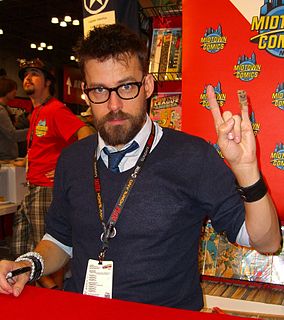A Quote by Nathan Englander
You spend so much time as a writer telling straight and linear stories.
Related Quotes
Humans are kind of story-propagating creatures. If you think of how we spend our days, think of all the time you spend on entertainment. How much of your entertainment centers around stories? Most pieces of music tell stories. Even hanging out with your friends, you talk, you tell stories to each other. They're all stories. We live in stories.
I think continuity is the devil. I think it's constricting and restrictive, I think it's alienating and off-putting, and it inflicts an artifact of linear time as we experience it on something that exists outside of linear time as well as keeps new readership away by keeping comics a matter of trivia and history rather than actual stories.
One of the most useful parts of my education as a writer was the practice of reading a writer straight through - every book the writer published, in chronological order, to see how the writer changed over time, and to see how the writer's idea of his or her project changed over time, and to see all the writer tried and accomplished or failed to accomplish.
I just think of myself as a writer. Yes, I'm a woman. And I'm a writer. The main challenge is that I like to write stories about young women, and society doesn't place much of a premium on young women's stories. And I think that's why I gravitate towards it. I really honor that, and I treasure that time, and they should be given that respect.
My real purpose in telling middle-school students stories was to practice telling stories. And I practiced on the greatest model of storytelling we've got, which is "The Iliad" and "The Odyssey." I told those stories many, many times. And the way I would justify it to the head teacher if he came in or to any parents who complained was, look, I'm telling these great stories because they're part of our cultural heritage. I did believe that.







































